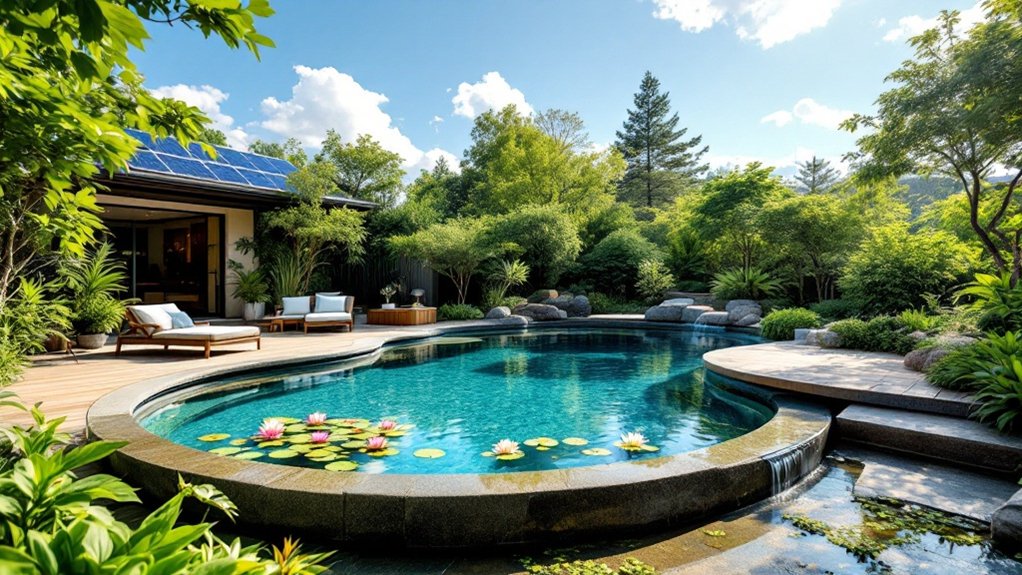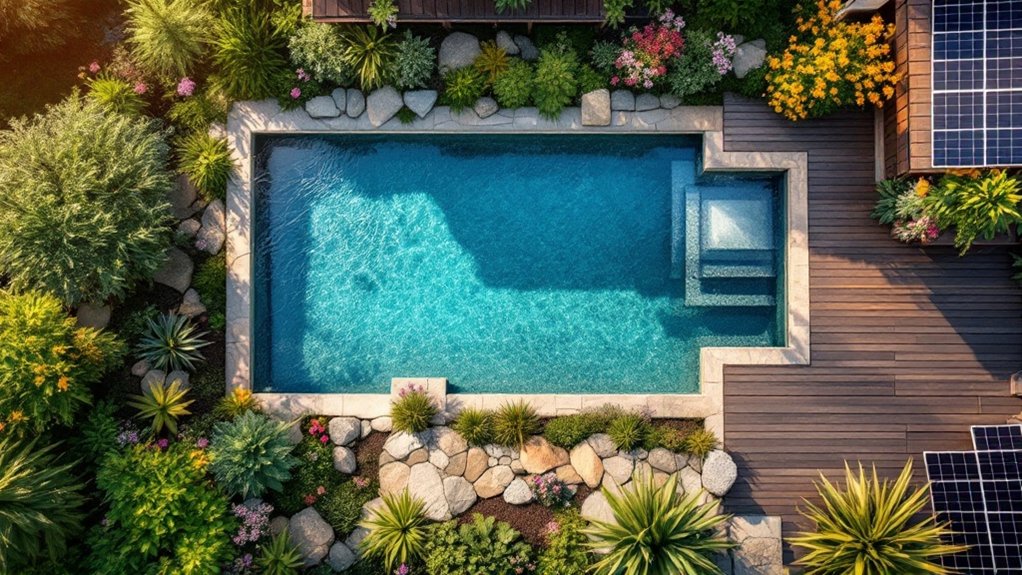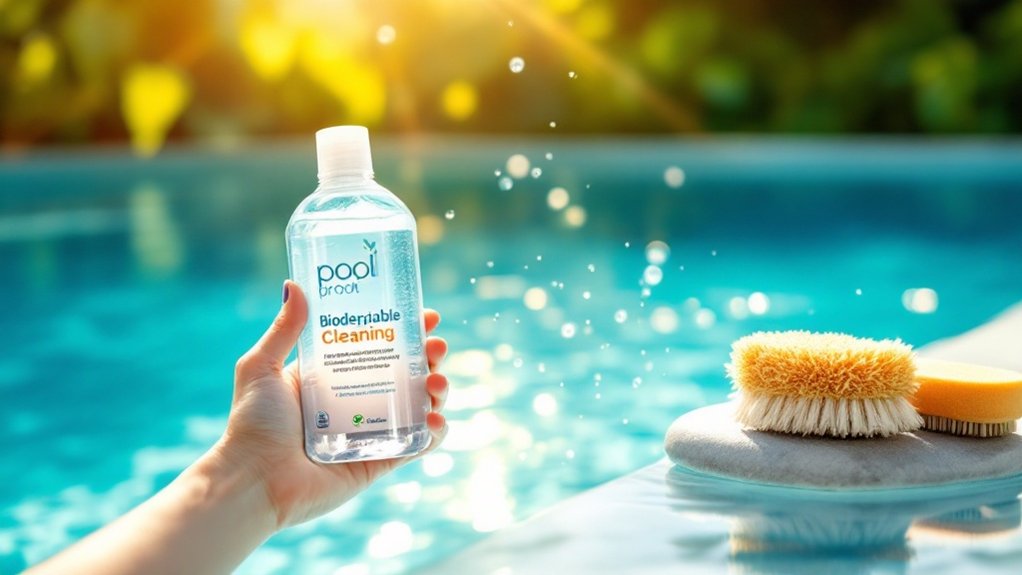The trend towards environmentally friendly pool options is gaining momentum among homeowners. Many are seeking ways to enhance their outdoor spaces while minimizing their ecological footprint. From natural swimming pools that employ biofiltration to energy-efficient heating solutions, there are numerous choices available. These alternatives not only promote sustainability but also offer aesthetic appeal. What innovative features can transform a traditional pool into an eco-conscious oasis?
Natural Swimming Pools: Embracing Biofiltration
As the demand for sustainable living grows, natural swimming pools have emerged as a popular alternative, utilizing biofiltration to create a clean, chemical-free swimming environment. These pools mimic natural ecosystems, using plants and microorganisms to filter and purify the water, eliminating the need for harsh chemicals. Typically designed with a regeneration zone, they allow aquatic plants to thrive, effectively maintaining water clarity and balance. The aesthetic appeal of natural swimming pools also enhances outdoor spaces, blending seamlessly with the surrounding landscape. In addition, their maintenance is often simpler and more environmentally friendly compared to traditional pools. By embracing natural swimming pools, homeowners not only enjoy a unique swimming experience but also contribute to environmental conservation, promoting a healthier lifestyle for both individuals and ecosystems.
Energy-Efficient Pool Heaters
Energy-efficient pool heaters play a vital role in reducing overall energy consumption while maintaining comfortable water temperatures. This section will explore various options, including solar pool heating systems and heat pumps, as well as compare gas and electric solutions. Understanding these technologies can help pool owners make informed choices that align with environmentally friendly practices. Additionally, modern gas pool heaters offer energy efficiency that saves money in the long run.
Solar Pool Heating Systems
Solar pool heating systems offer an innovative and sustainable solution for maintaining comfortable water temperatures in swimming pools. Utilizing the sun’s energy, these systems consist of solar collectors that absorb sunlight and transfer heat to the pool water. This eco-friendly approach considerably reduces reliance on conventional heating methods, leading to lower energy bills and a smaller carbon footprint. Installation is typically straightforward, allowing for integration with existing pool systems. Additionally, solar pool heaters can extend the swimming season, enabling enjoyment even in cooler months. By harnessing renewable energy, these systems not only promote environmental responsibility but also enhance the overall swimming experience, making them an attractive choice for pool owners seeking to minimize their ecological impact.
Heat Pumps Explained
While traditional gas or electric heaters can lead to high energy costs, heat pumps present a more energy-efficient alternative for pool owners. These devices operate by transferring heat from the air or ground to the pool water, making them considerably more energy-efficient than conventional heating methods. Heat pumps can maintain comfortable water temperatures while using less energy, leading to lower utility bills over time. They are particularly effective in warmer climates, where the ambient temperature is conducive to their operation. Additionally, heat pumps contribute to a more sustainable approach to pool heating, as they utilize renewable energy sources. Their longevity and reduced environmental impact make them an appealing choice for environmentally conscious pool owners.
Gas vs. Electric Options
How do gas and electric pool heaters compare with respect to efficiency and cost-effectiveness? Gas heaters typically heat water quickly and are ideal for those who prioritize rapid heating, particularly in cooler climates. However, they often involve higher operational costs due to fluctuating gas prices and greater energy consumption. In contrast, electric heaters tend to be more energy-efficient and have lower operational costs, making them a suitable option for warmer climates or smaller pools. Their initial installation costs may be lower, but they generally heat water more slowly. Ultimately, the choice between gas and electric options depends on individual preferences, budget constraints, and local energy prices, ensuring that pool owners can select the most appropriate heating solution for their needs.
Solar Pool Covers: Harnessing the Sun
Solar pool covers offer significant energy efficiency benefits by reducing heat loss and minimizing the need for additional heating sources. Over time, homeowners can experience substantial cost savings through lower energy bills and decreased maintenance expenses. This eco-friendly option not only enhances pool enjoyment but also contributes to a more sustainable lifestyle.
Energy Efficiency Benefits
Many homeowners are discovering the considerable energy efficiency benefits of solar pool covers, which effectively harness the sun’s power to maintain ideal water temperatures. These covers act as a barrier, reducing heat loss during the night and on cooler days. By trapping heat from the sun, they can greatly decrease the need for additional heating, leading to reduced energy consumption. Additionally, solar pool covers minimize evaporation, which not only conserves water but also lowers the energy required for water replacement and heating. This dual benefit enhances overall energy efficiency, making solar pool covers an eco-friendly choice for pool maintenance. As awareness grows, more homeowners are likely to adopt this sustainable option, contributing to a greener environment.
Cost Savings Over Time
Although the initial investment in solar pool covers may seem significant, the long-term cost savings they provide can be substantial. By effectively trapping heat, these covers reduce heating costs, allowing pool owners to rely less on traditional heating methods. This leads to lower energy bills, especially during colder months. Additionally, solar pool covers minimize water evaporation, which conserves water and decreases the need for frequent replenishment, further reducing costs. They also help keep pools cleaner, reducing the amount of chemicals needed for maintenance. Over time, these savings can offset the initial purchase price, making solar pool covers a financially sound choice for environmentally conscious pool owners looking to minimize both their ecological footprint and operational expenses.
Eco-Friendly Pool Chemicals
A growing number of pool owners are turning to eco-friendly pool chemicals as a sustainable alternative to traditional options. These environmentally friendly products often use natural ingredients, minimizing harmful effects on both human health and aquatic ecosystems. Popular options include saltwater systems, which reduce chlorine usage, and enzymatic cleaners that break down organic matter without harsh chemicals. Additionally, mineral-based sanitizers, such as those using copper and silver, effectively combat bacteria while being less harmful to the environment. As awareness of chemical pollution increases, many pool owners are seeking ways to maintain clean and safe swimming environments without compromising ecological integrity. Ultimately, the shift toward eco-friendly pool chemicals reflects a broader commitment to sustainability in recreational water use.
Rainwater Harvesting Systems
As pool owners seek sustainable solutions, rainwater harvesting systems have emerged as an effective way to collect and utilize natural precipitation for pool maintenance. These systems capture rainwater from rooftops and other surfaces, storing it in tanks for later use. When integrated into pool care, harvested rainwater can greatly reduce reliance on municipal water sources, lowering overall water bills and conserving resources.
The installation of these systems typically involves gutters and downspouts that direct rainwater into storage tanks equipped with filters to guarantee cleanliness. Rainwater can be used for pool filling, backwashing, and maintaining water levels, making it an eco-friendly alternative. By adopting rainwater harvesting, pool owners can enhance sustainability while enjoying their outdoor oasis.
LED Pool Lighting: Brighten Your Space Sustainably
Integrating energy-efficient solutions into pool maintenance goes beyond water conservation. One effective way to enhance sustainability is through the use of LED pool lighting. Unlike traditional incandescent bulbs, LED lights consume considerably less energy while providing ample illumination for nighttime swimming and gatherings. This technology not only reduces electricity bills but also has a longer lifespan, minimizing the frequency of replacements. Additionally, LED lights come in a variety of colors and designs, allowing pool owners to create a visually appealing atmosphere. With options for dimming and smart controls, these lights can be tailored to suit various moods and occasions. Choosing LED lighting reflects a commitment to eco-friendliness, making pools more enjoyable while contributing to a greener planet.
Variable Speed Pool Pumps
Variable speed pool pumps offer significant advantages for eco-conscious pool owners. Their energy-efficient design not only reduces electricity consumption but also minimizes noise during operation. Over time, these pumps can lead to substantial cost savings, making them a smart investment for sustainable pool maintenance.
Energy Efficiency Benefits
A considerable number of pool owners are turning to variable speed pool pumps for their energy efficiency benefits. These pumps operate at different speeds, allowing users to adjust the flow rate based on specific needs, such as filtration, heating, or cleaning. By running at lower speeds for extended periods, variable speed pumps consume markedly less energy compared to traditional single-speed models. This reduction in energy consumption leads to lower utility bills, making them a cost-effective choice in the long run. Additionally, the energy efficiency of these pumps contributes to a reduced carbon footprint, aligning with environmentally friendly practices. Overall, variable speed pool pumps represent a smart investment for both the wallet and the planet.
Noise Reduction Features
Many pool owners appreciate the quiet operation of variable speed pool pumps, which considerably reduce noise levels compared to traditional single-speed pumps. These pumps utilize advanced technology that allows them to operate at varying speeds, resulting in less strain on the motor and a more peaceful environment. By running at lower speeds for routine filtration, they minimize both energy consumption and sound output. This feature is particularly beneficial for homeowners with pools located near living spaces or in residential neighborhoods where noise regulations may apply. As a result, variable speed pumps not only enhance the enjoyment of poolside activities but also contribute to a more serene outdoor atmosphere, making them an attractive option for those seeking tranquility in their backyard oasis.
Cost Savings Over Time
While initial investments in variable speed pool pumps may be higher than traditional options, the long-term cost savings can be considerable. These pumps operate at various speeds, allowing for more efficient energy use and reducing electricity bills. By running at lower speeds for extended periods, they minimize wear and tear on the system, leading to lower maintenance costs over time. Additionally, variable speed pumps can considerably reduce water consumption, as they allow for better filtration with less run time. Many users report savings of up to 90% on energy costs compared to single-speed pumps. Over the lifespan of the equipment, these savings can offset the initial purchase price, making variable speed pumps a financially sound choice for pool owners.
Sustainable Decking Materials
Sustainable decking materials have gained increasing popularity among environmentally conscious homeowners seeking to enhance their outdoor spaces. These materials, often made from recycled or responsibly sourced resources, provide an eco-friendly alternative to traditional wood decking. Options such as composite decking, crafted from a blend of recycled plastics and wood fibers, offer durability and low maintenance while reducing deforestation. Additionally, bamboo, known for its rapid growth and renewability, serves as another attractive choice. Homeowners are also turning to reclaimed wood, which not only minimizes waste but adds unique character to outdoor areas. By selecting sustainable decking materials, individuals can create beautiful, functional spaces that align with their commitment to environmental stewardship, ultimately contributing to a healthier planet.
Water-Saving Pool Features
Implementing water-saving pool features can greatly reduce water consumption and promote responsible usage. One effective option is incorporating a pool cover, which minimizes evaporation and keeps debris out. Additionally, automatic water levelers can maintain consistent water levels, preventing overfilling and waste. Rainwater harvesting systems can also be utilized, collecting and storing rainwater for pool use, thereby conserving municipal water resources. The installation of efficient filtration systems reduces the need for frequent water changes, further conserving water. Choosing plants that require minimal irrigation for landscaping around the pool can complement these features. By adopting these water-saving strategies, pool owners can enjoy their recreational spaces while contributing to environmental sustainability and responsible water management. Regular pipe cleaning is also essential to ensure efficient water circulation and reduce strain on pool equipment.
Smart Pool Technology for Efficiency
As pool owners seek greater efficiency and convenience, smart pool technology has emerged as a game-changer in managing pool operations. This innovative technology encompasses automated systems for monitoring and controlling various aspects of pool maintenance, including water temperature, filtration, and chemical balance. By integrating smart devices and apps, users can remotely manage their pools, optimizing energy consumption and reducing operational costs. Additionally, features such as automatic cover systems and variable-speed pumps enhance energy efficiency while promoting sustainability. Smart sensors can detect water quality, alerting owners to potential issues before they escalate. Overall, the adoption of smart pool technology not only elevates the user experience but also contributes to environmentally friendly practices, aligning with the growing emphasis on sustainability in pool management.
Frequently Asked Questions
How Much Do Environmentally Friendly Pools Typically Cost?
The cost of environmentally friendly pools varies widely, typically ranging from $20,000 to $100,000. Factors influencing the price include design, materials, size, and additional features, impacting overall investment in sustainable pool solutions.
What Maintenance Is Required for Natural Swimming Pools?
Maintaining natural swimming pools involves regular monitoring of water quality, balancing pH levels, managing plant growth, and ensuring proper filtration. Additionally, seasonal cleaning and occasional adjustments to the ecosystem are necessary for ideal performance and hygiene.
Are There Any Health Benefits to Eco-Friendly Pool Options?
Eco-friendly pool options provide numerous health benefits, including reduced exposure to harsh chemicals, improved water quality, and enhanced overall well-being. These pools often promote a more natural swimming experience, contributing positively to physical and mental health.
Can I Convert My Traditional Pool to an Environmentally Friendly One?
Converting a traditional pool to an environmentally friendly one is feasible. Homeowners can install energy-efficient pumps, utilize solar heating, and implement natural filtration systems, considerably reducing chemicals and energy consumption while enhancing sustainability and reducing environmental impact.
What Are the Best Plants for Natural Swimming Pools?
The best plants for natural swimming pools include water lilies, cattails, and horsetail. These aquatic plants help maintain water clarity, provide habitat for wildlife, and enhance the pool’s aesthetic, creating a balanced ecosystem.
Conclusion
Incorporating environmentally friendly pool options not only enhances the aesthetic appeal of outdoor spaces but also promotes sustainability. By embracing natural swimming pools, energy-efficient heating solutions, and eco-friendly chemicals, pool owners can create a serene oasis that aligns with their commitment to the planet. With advancements in technology and design, these sustainable choices guarantee that enjoyment and environmental responsibility go hand in hand, allowing individuals to relish their pools while minimizing their ecological footprint.




